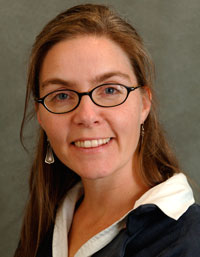|
Summary of her talk: "Women’s experiences with orgasm and the common phenomenon of faking orgasm have been neglected in the psychological literature. Contrary to the assumption that women would fake because they are incapable of orgasm with a partner, researchers have found that women who fake orgasm have higher levels of sexual esteem and more sexual experience than women who do not. "In this presentation, I will review this literature and extend it by discussing evidence for the possibility that women who fake orgasm may have a tendency to view their sexual functioning as performative rather than as a source of their own pleasure and to be more concerned about partner approval than their own authentic sexual satisfaction. Implications for future research and theory will be considered." --Dr. Johnston-Robledo |
Students will present their research on gender via posters and oral presentations at the annual Women’s Studies Research Conference on Wednesday, March 24. The conference will take place at 5 p.m. in the Horizon Room of the Williams Center. The event is free and open to the public.
Ingrid Johnston-Robledo, director of Women’s Studies, will give the keynote address titled, "Faux Orgasms and Women’s Sexual Subjectivity."
The Women’s Studies Research Conference will provide faculty and students with an opportunity to share research, network, and socialize. This year’s conference will allow for more student participation through the incorporation of panel presentations and a poster session. The Feminist Practice (WOST401) capstone productions will also be showcased at the conference.
The 2010 recipient of the Women’s Studies Jeanette McVicker Scholarship will be announced at the conference as well.
About Dr. Johnston-Robledo
A social psychologist, associate professor in the Psychology Department, and director of Women's Studies at SUNY Fredonia, Dr. Ingrid Johnston-Robledo, teaches courses on the Psychology of Women, Women’s Health, and Human Sexuality.
Her primary area of expertise is reproductive and sexual health, with an emphasis on psychosocial aspects of menstruation, breastfeeding, postpartum adjustment, and motherhood. Much of her work focuses on the extent to which women’s experiences with their reproductive and sexual health are limited by the extent to which they internalize cultural messages about their bodies.
She is an elected member of the Board for the Society for Menstrual Cycle Research, the Secretary for Division 35 (Society for the Psychology of Women) of the American Psychological Association, and a Fellow of the American Psychological Association. She received her doctoral degree in Experimental Psychology from the University of Rhode Island.




